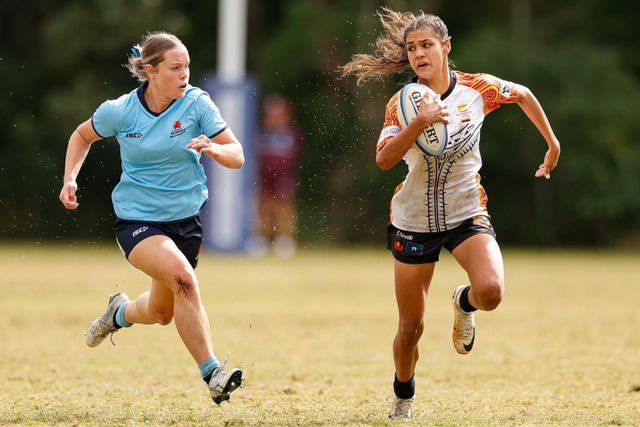
The Indigenous programs initiated by the Queensland Reds in 2010 were not about participation but, firstly, building a strong base of relationships.
Improving education outcomes and opportunities for young people to train for jobs were goals.
The Future Indigenous Leadership Program, backed successfully for many years by Rio Tinto, was another vehicle to enable youngsters to reach their full potential.
“Playing the game has only ever been part of the vision across nearly 15 years of growth, respect and understanding for which the QRU feels significant pride,” said David Hanham, the Queensland Rugby Union’s chief executive officer.
Fast forward to 2024 and the benefit of those longstanding relationships have borne fruit in the subtle ways everyone hoped.
At the successful Queensland Country Championships in Rockhampton, more than 1000 players gathered from around the state for boys and girls competitions.
Of those, 10 per cent identified as Aboriginal or Torres Strait Islander.
At the recent Australian Schools Championships on the Sunshine Coast, three Aboriginal and Torres Strait Islander girls from Queensland won nods in Merit teams for their strong futures in sevens.
Taliah Anderson and Aamira Renouf, niece of former Brisbane Broncos star Steve, excelled and were recognised in the Australian Under-16 Merit team. Equally, Aaliyah Sheppard was a Merit high-achiever in the Under-18s.
Seeing those girls shine in the Lloyd McDermott Rugby Development teams, “The Lloydies”, with the increased opportunities for teenage girls in sevens was a big plus in Caloundra.
Rhani Hagan, pacy and skilful, is already on her way as a member of the Australia A sevens side which had a successful tour of Japan.
In NAIDOC Week, it’s timely to reflect on the gains.
“The journey didn’t start with playing our game, it started with relationships and demonstrating our values to Indigenous communities in building trust, respect and a willingness to partner,” said Selwyn Button, a proud Indigenous man and QRU Board director.
That’s why wearing an Indigenous jersey is so much more than just manufacturing a jersey.
It’s the engagement with younger members of the community to hear and act on their design ideas from the initial outline to the finishing product that all can be proud of. It’s a collaboration.
“Over time, all these things have led to a significant increase in the number of active Indigenous participants in all areas of our game across all geographic locations,” Button said.
“Seeing the three Oates brothers play for University in the same side and being involved in a try together was fantastic. More club sides are now creating their own Indigenous jerseys.
“These are among the reasons that 2024 represents a major milestone for Indigenous rugby in Queensland where every representative team from our men’s and women’s Reds through to our Under-16 boys and girls sevens teams all have Indigenous players represented in them.”
Dylan Blackman, the QRU’s indigenous strategies manager, added extra detail.
“It’s not just the opportunities for players. We want to be welcoming to coaches, new officials, volunteers, families and their communities,” he said.
Any organisation’s Reconciliation Action Plan (RAP) adds a level of accountability and goal-setting.
Hanham made the strong point it is an ongoing process.
“Reconciliation is a continuous journey which means the QRU will always pause to examine, reflect and adjust our efforts,” Hanham said.





